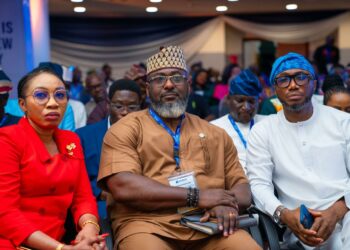The Nigerian Startup Bill (NSB) that was signed into law by President Muhammadu Buhari on October 19, has aptly been described as the key to the transformation of the nation’s digital technology and the enhancement of the entrepreneurship ecosystem in the country.
This was the focus of a three-day Digital Nigeria Conference with the theme: “Digital Transformation- A Path to Sustainable Digital Economy,” which started at the International Conference Centre in Abuja on Tuesday October 25, 2022.
Minister of communications and digital economy, Prof. Isa Ali Ibrahim Pantami, said the Startup Act will create an enabling environment and boost the potential of the Nigerian youth in the digital economy to create jobs. Following the enormous efforts into making the bill a reality.
“The Startup Act as a principal legislation is a major achievement that will significantly enhance the digital innovation in the country,” the minister said.
Digital Nigeria is captured in the National Digital Economy Policy and Strategy (NDEPS) which is anchored on 8 pillars that provide a holistic and sustainable approach towards the development of Nigeria’s digital economy.
The 8 pillars include; Developmental Regulation; Digital Literacy and Skills; Solid Infrastructure; Service Infrastructure; Digital Services Development and Promotion; Soft Infrastructure; Digital Society and Emerging Technologies; and Indigenous Content Development and Adoption.
“The implementation of a digital economy policy accelerates digitalisation and this in turn enhances the digital economy. Digitalisation increases efficiency, reduces waste, enhances productivity, increases transparency and supports datafication, amongst other things,” Pantami said.
Also speaking at the conference, the director general of the National Information Technology Development Agency (NITDA), Kashifu Inuwa, said the digital economy is changing and shifting economic power, reshaping products and proffering alternatives to businesses.
He said the Startup Act will further push Nigeria as a talent supplier to the rest of the world. He noted that through startups Nigeria can create innovation- driven enterprises, adding that the government has implemented several initiatives to achieve this and that is why the Nigerian ecosystem is the most vibrant in Africa.
“Technological advancement and Artificial Intelligence, Robotics, Blockchain and innovation are expanding the frontiers of digital transformation. In 2020 when COVID- 19- hit the world, it accelerated that trajectory and now the future is arriving faster than we are expecting and the future is dazzled with the brilliance and innovation of digital offering.
“Therefore, digital transformation is not just about technology, it is about designing people, technology and processes to deliver things the way you want it, when you want it and how you want it.
“Digital transformation and sustainability are increasingly important and intertwined and it is full of promises and pitfalls. But to achieve sustainability we need a strategy to realise the promises, while avoiding the pitfalls,” he said.
The Startup Act will improve investment and create the necessary regulatory framework that will enhance the sector especially now that the digital economy policies of the federal government of President Muhammadu Buhari have pushed government quarterly revenues from N51 billion to N 408.7 billion, through spectrum sales and taxes from the sector.
This huge revenue played a critical role in enabling Nigeria to exit recession even as the ICT sector provided three unprecedented contributions to the Gross Domestic Product (GDP) of the country in the last three years, namely 14.07 per cent in Q1 2020, 17.92 per cent in Q2 2021 and 18.44 per cent in Q2 2022.
According to the minister, at each time, these numbers have been the highest ever contribution of the ICT sector to the GDP.
As of today 863,372, citizens benefited from digital skills programmes, while the federal government signed Memorandum of Understanding (MoU) with leading global companies like Microsoft, Google and Huawei, to train more than five million Nigerians.
The official broadband penetration figures have also increased from 33.72 per cent to 44.65 per cent, representing close to 13 million new broadband users. The percentage 4G coverage across the country increased from 23 per cent to 77.52 per cent.
The Digital Identity enrolments have also been very successful, with issued National Identification Numbers (NINs) rising from less than 40 million to over 90 million.
As about 355,610 direct and indirect jobs were being created, privacy concerns are also being addressed through the newly established Nigeria Data Protection Bureau (NDPB) as the data protection bill has reached an advanced stage.
The government needs to improve on these achievements especially in the area of attracting venture capital, which many believe is a challenge to the sector.





